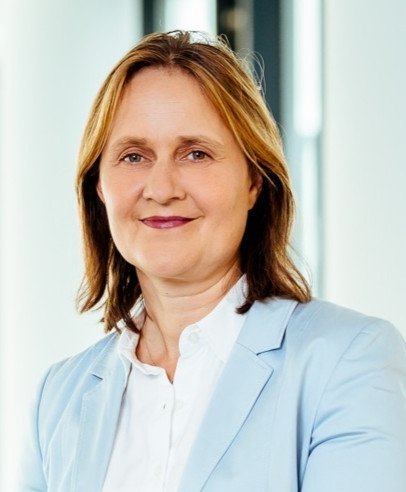
Image source: Bayer
News • Expert roundtable at ECR 2023
How AI will shape the future of radiology
In healthcare, and particularly medical imaging, innovation powered by artificial intelligence is needed more than ever before, according to an expert media panel hosted by Bayer at the European Congress of Radiology (ECR) in Vienna.
The media roundtable titled “Shaping the Future of Radiology” explored key trends in radiology and how Bayer is helping to shape innovations to benefit patients and their treating physicians.

“Medical imaging plays a key role along the entire patient journey, in facilitating diagnosis, treatment decisions and monitoring the patients’ response to treatment,” said Dr. Konstanze Diefenbach, Head of Research and Development Radiology at Bayer. “Increasingly, radiology departments are under enormous pressure with a significant rise in the medical imaging data they need to assess, and innovative solutions are urgently needed.” The increasing pressure and workload are accelerated by the continuous growth and complexity of imaging data as a result of technical advances1 and a growing demand for imaging procedures because of aging populations and changing lifestyles.2
In this context, AI has the potential to be part of the solution with the value proposition to support diagnosis and increase the throughput of radiological examinations. Serving as a springboard for innovation, radiology AI is the fastest growing market segment within the overall global radiology market and it is expected to continue growing dynamically, with an estimated compounded annual growth rate of more than 26% through 2026.3 As AI is making its way into clinical radiology practice, it is crucial that it gains the trust of experts.

Image source: University of Bern
At Bayer’s media event, Prof. Roland Wiest, Deputy Director, University of Bern, Institute of Diagnostic and Interventional Neuroradiology, Switzerland, discussed the importance of education to help drive adoption of AI in clinical practice. “Appropriate training is key to successfully govern AI,” he underlined in his presentation. “Radiologists, not AI, will remain in charge for patient care and need to acquire new skills to do their best for patients in the new AI ecosystem.” Prof. Wiest is leading several educational initiatives aiming at driving medical, engineering, and practical capabilities in radiology to support the wider use of AI-based technologies.
During the discussion, Bayer provided an update on some of the latest developments from the company in this area, all with the goal to make a positive impact through AI in Radiology, including:
- Strategic partnerships in AI - The company recently launched Calantic Digital Solutions – a new platform delivering access to digital applications, including artificial intelligence enabled tools, for medical imaging. On the occasion of ECR 2023, Bayer announced that it will partner with app developers Mediaire, Coreline, and ScreenPoint Medical to strategically expand the offering of Calantic Digital Solutions. With these new collaboration agreements, Bayer is broadening the already available options on the platform by including tools which aim to aid in neuro, cardiac and breast imaging.
- Acquisition of Blackford - Bayer recently acquired Blackford Analysis, a global strategic imaging AI platform and solutions provider. With Blackford bringing more than 10 years of experience in the imaging AI market, this partnership is expected to bolster Bayer's position in digital medical imaging, while complementing the company’s comprehensive radiology portfolio and demonstrating the company’s engagement to drive innovation in radiology, including AI, to improve patient care.
Recommended article

News • Artificial intelligence in radiology
Bayer acquires AI solutions provider Blackford Analysis
Bayer announced the acquisition of Blackford Analysis Ltd., a global strategic imaging platform and solutions provider for artificial intelligence (AI) in radiology.
- Research and development efforts in AI - Bayer is continuing to focus on AI innovation through Research & Development efforts. Focus in this area are, for example, patient education tools, support in workflow efficiency, contrast media dose optimization and tools aiding in the early identification of findings.

Dr Ankur Sharma, Head of Medical Affairs, Digital Radiology, Bayer concluded: “Radiology has always been at the forefront of digital innovation, and artificial intelligence, in particular, has vast potential in medical imaging. Bayer’s long established medical expertise and commitment to innovation across a multitude of diagnostic and therapeutic areas is what we will bring to the AI space in Radiology as a point of significant focus. Our aim is to help shape the future of radiology, transform treatment outcomes, and patient care.”
References:
- McDonald et al.: The effects of changes in utilization and technological advancements of cross-sectional imaging on radiologist workload; Academic Radiology 2015
- World Health Organisation: Fact sheet: Ageing and Health
- Signify Research: AI in Medical Imaging – World Market Analysis 2022
Source: Bayer
07.03.2023










